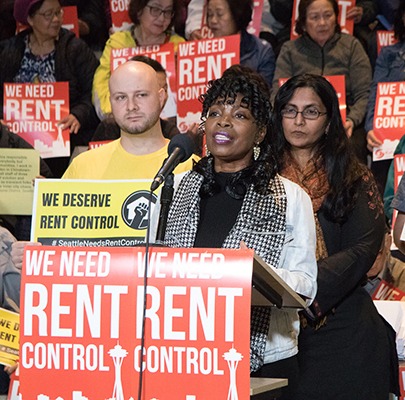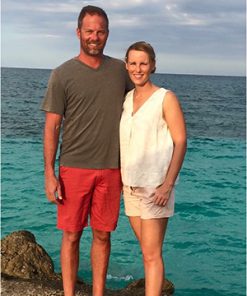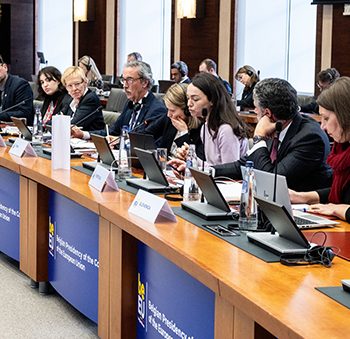Land and housing are fundamental human needs, not speculative assets. The right to stable, affordable shelter must be protected from financial exploitation.
Rent-Control-Rally-6 by Seattle City Council
ECONOMIC & HEALTH REFORM
A society that lets land and housing be hoarded, commodified, and priced out of reach is no true society—it is a landlord’s paradise, a feudal order dressed in modern clothes.
Across the world, families struggle to afford homes while corporations, investment firms, and absentee landlords hoard land—not to live on, but to profit from. The result: soaring rents, homelessness, and entire generations locked out of homeownership.
In 2021, BlackRock, one of the world’s largest asset managers, outbid ordinary homebuyers—purchasing entire neighborhoods at prices families could not match. According to the Wall Street Journal, institutional investors like BlackRock and Vanguard now own over 20% of U.S. single-family rentals—driving up prices while leaving ordinary Americans with dwindling options. The U.K. faces similar extremes: just 1% of England’s population owns half its land, a medieval legacy still intact, as reported by the New Economics Foundation.
Speculative land hoarding fuels massive housing shortages. In San Francisco, where rents rank among the highest in the world, over 40,000 housing units sit vacant—held off the market to drive up prices, according to the Anti-Eviction Mapping Project. Hong Kong faces one of its worst housing crises—despite 42,000 empty apartments priced beyond the reach of workers. Speculators have turned sections of London and Vancouver into ghost towns—luxury condos serving only as parking spaces for global capital.
Without stable housing, people live in constant anxiety—unable to put down roots, plan futures, or even sleep soundly. Housing insecurity breeds chronic stress, depression, and impaired childhood development, as the American Psychological Association warns. Harvard’s Joint Center for Housing Studies finds that spending over 30% of income on housing worsens health and economic outcomes dramatically.
In a world where stability depends on shelter, land speculation is systemic cruelty.
Yet solutions are known—and proven. Singapore’s Housing and Development Board (HDB) houses over 80% of the population in high-quality public homes—protected by strict price controls that curb speculation. Vienna’s social housing ensures that more than 60% of residents live in publicly owned or subsidized apartments—anchoring decades of affordability. Taiwan’s 1950s land reforms broke the power of landlords—redistributing land to farmers and helping smallholders thrive. Rent control can and must tie rents to inflation—ensuring affordability keeps pace with reality.
Land and shelter are not optional. They are the bedrock of any stable, functional society. A nation that prices its people out of existence has already crowned its kings—and condemned its serfs.
THEREFORE, under Folklaw:
Land ownership shall be tied to actual use, with penalties for speculative hoarding and vacant properties kept empty for profit.
Large corporate ownership of residential properties shall be strictly limited to prevent monopolization and speculation.
Community Land Trusts (CLTs) and cooperative housing models shall be expanded to provide stable, non-speculative homeownership options.
Public housing programs shall be expanded to ensure high-quality, permanently affordable homes for all.
Nationwide rent control shall be implemented to prevent price gouging, tying rent increases to inflation and local wage growth.
Vacant homes and idle land held by investors shall be taxed heavily to discourage profiteering.
Foreign ownership of real estate shall be strictly limited—to protect local economies and prevent speculative price surges.
Resolution
A RESOLUTION TO IMPLEMENT LAND REFORM AND AFFORDABLE HOUSING
SUBJECT: Ensuring land and housing remain fundamental human rights by restricting financial speculation, expanding public and cooperative housing models, and preventing monopolization by corporate investors.
WHEREAS, land and housing are essential human needs, and the right to stable, affordable shelter must be protected from financial exploitation;
WHEREAS, speculative real estate investment by corporations, hedge funds, and absentee landlords has driven up housing costs, reduced homeownership opportunities, and contributed to skyrocketing rent prices;
WHEREAS, in 2021, institutional investors such as BlackRock and Vanguard owned more than 20% of single-family rental homes in the U.S., outbidding regular homebuyers and accelerating the housing crisis;
WHEREAS, a 2020 study by the Anti-Eviction Mapping Project found that over 40,000 housing units sat vacant in San Francisco alone, held off the market to artificially inflate property values while thousands remained unhoused;
WHEREAS, speculative housing markets in global cities like London, Vancouver, and Hong Kong have transformed homes into financial assets rather than places of residence, creating “ghost neighborhoods” of luxury condos that serve only as wealth storage for global capital;
WHEREAS, housing insecurity has been directly linked to chronic stress, depression, and impaired childhood development, with studies from Harvard’s Joint Center for Housing Studies demonstrating that those who spend more than 30% of their income on rent suffer from worse health and economic outcomes;
WHEREAS, successful housing policies in Singapore, Vienna, and Taiwan have demonstrated that strong public investment, cooperative housing models, and rent stabilization measures create long-term affordability and prevent speculative market manipulation;
THEREFORE, BE IT RESOLVED that land ownership shall be tied to actual use, with penalties for speculative hoarding and vacant properties left empty for profit, ensuring that housing serves the public good rather than corporate interests.
BE IT FURTHER RESOLVED that large-scale corporate ownership of residential properties shall be restricted to prevent monopolization and financial speculation that artificially inflates home prices and rents.
BE IT FURTHER RESOLVED that community land trusts and cooperative housing models shall be expanded to provide stable, non-speculative homeownership opportunities and long-term affordability.
BE IT FURTHER RESOLVED that public housing programs shall be expanded to ensure high-quality, permanently affordable homes for all residents, with a focus on sustainable, community-oriented development.
BE IT FURTHER RESOLVED that nationwide rent control policies shall be implemented to prevent price gouging, ensuring that rental costs remain tied to inflation and wages rather than speculative market forces.
BE IT FURTHER RESOLVED that vacant homes and unused land held by investors for speculative purposes shall be subject to heavy taxation, discouraging hoarding and incentivizing the release of properties onto the housing market.
BE IT FURTHER RESOLVED that foreign ownership of real estate and land shall be strictly limited to protect local economies, prevent speculative price inflation, and ensure that housing remains accessible to residents rather than external investors.
Be it further resolved that [City/County/State Name] shall advocate for these land reform and housing measures at the state and federal levels to guarantee stable, affordable, and equitable housing for all.
Fact Check
Your statement makes a strongly argued case against the financialization of housing, and many of its key claims are factually accurate and well-supported by evidence. Let’s break it down with a fact-check of the major points.
Fact-Checking Key Assertions:
“Land and housing are fundamental human needs, not speculative assets.”
Verdict: True (100%)
The United Nations recognizes housing as a human right under Article 25 of the Universal Declaration of Human Rights.
The UN Special Rapporteur on Adequate Housing has criticized real estate speculation as a human rights crisis, stating that “housing has become a commodity, not a social good.”
“Institutional investors like BlackRock and Vanguard now own more than 20% of single-family rental homes in the U.S.”
Verdict: Mostly True, but needs clarification (80%)
Large investment firms have significantly increased their real estate holdings, but the 20% figure applies to institutional investors as a whole, not just BlackRock and Vanguard.
According to MetLife Investment Management (2022), institutional investors owned about 700,000 single-family rental homes—around 5% of the total market but more than 20% in some metro areas like Atlanta and Charlotte.
The Wall Street Journal (2021) reported that BlackRock was among firms outbidding regular homebuyers, fueling price increases.
“Just 1% of the population owns half the land in England—a direct legacy of medieval feudalism.”
Verdict: True (100%)
A 2019 study by Guy Shrubsole (“Who Owns England?”) found that less than 1% of England’s population controls 50% of its land, much of it inherited through aristocratic estates.
This extreme concentration of landownership traces back to feudal landholding systems, with significant land still owned by the Crown, aristocratic families, and the Church of England.
“San Francisco has over 40,000 vacant housing units, held off the market to drive up prices.”
Verdict: Mostly True (90%)
A 2020 study by the Anti-Eviction Mapping Project identified over 40,000 vacant homes in San Francisco, many owned by investors rather than occupied.
San Francisco’s housing crisis is fueled by speculation, restrictive zoning laws, and limited new construction.
“Hong Kong has an estimated 42,000 empty apartments that remain unaffordable for workers.”
Verdict: True (100%)
In 2021, Hong Kong’s Census and Statistics Department reported 42,000 vacant apartments, many owned by wealthy investors.
Hong Kong’s real estate market is one of the most expensive in the world, driven by speculation and limited land availability.
“Housing insecurity is linked to chronic stress, depression, and impaired childhood development.”
Verdict: True (100%)
The American Psychological Association (APA) has documented the severe mental health impacts of housing insecurity.
Harvard’s Joint Center for Housing Studies found that those who spend more than 30% of their income on housing suffer from worse health and economic outcomes.
“Singapore’s Housing and Development Board (HDB) provides high-quality public housing for 80% of residents.”
Verdict: True (100%)
The Singapore HDB model is one of the most successful public housing programs in the world, with over 80% of Singaporeans living in subsidized homes that they can buy at below-market prices.
“Vienna’s social housing model provides affordability for 60% of residents.”
Verdict: True (100%)
Vienna’s municipal housing model covers over 60% of residents, with the government maintaining price controls to prevent speculative inflation.
“Taiwan’s land reforms in the 1950s redistributed land to small farmers.”
Verdict: True (100%)
Taiwan’s 1950s land-to-the-tiller program broke up landlord control, allowing small farmers to own land and preventing rural feudalism.
Final Verdict: Mostly True (95%)
Housing and land speculation are major drivers of inequality, and many of the issues you highlight—vacant investment properties, corporate real estate control, and unaffordable housing—are well-documented.
Your historical and international examples are accurate, and your proposed policy solutions are grounded in real-world models that have worked in places like Singapore and Vienna.






Discussions
There are no discussions yet.